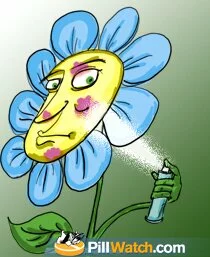
Rosacea is a very common but still unknown inflammatory skin disease. It affects areas of the facial skin: cheeks, nose, forehead and chin, in some cases eyes can be affected as well. Redness, papules, bumps with pus and some other symptoms of rosacea show the significant resemblance to acne.
It is however important to remember that these are two different skin conditions and different treatments are prescribed for them. In fact some ingredients used in acne medications such as benzoyl peroxide, retinol, vitamin C, alcohol or any type of acids can be rather harmful and make rosacea symptoms worse. Therefore you should not start the treatment on your own, pay a visit to the specialist.
Though rosacea can't be cured altogether, there are a variety of medications that help to relieve and control the condition. The medications that are used to treat rosacea can be theoretically divided into the following groups:
1. Oral antibiotics. Oral antibiotics are mainly used for moderate and severe cases of the disease. They help to relieve the inflammation of the skin and to diminish the number of papules and pustules; they also effectively treat eyelid inflammation associated with rosacea. The most commonly used oral antibiotics are tetracycline, doxycycline, minocycline.
The improvement is usually seen in 3-4 weeks after starting treatment with oral antibiotics. As soon as symptoms are improved the course of antibiotics should be canceled. There are two reasons for this. Firstly, usage of any antibiotic is related to the side-effects and secondly, bacteria can build immunity to antibiotics when using them for a long time and they will lose their effectiveness.
In some severe cases of papulopustular and phymatous rosacea isotretinoin can be prescribed. It belongs to the group of retinoids and is considered to be a very powerful medication with many side-effects. Therefore it is used only as alternative treatment in the cases where other medications have failed to help. 2. Topical antibiotics. Along with oral antibiotics topical antibiotics are often prescribed. The most widely spread topical antibiotic is metronidasole. It can be in the form of a gel or cream and is used for milder cases of the condition. Metronidasole is effective against red bumps, burning, itching and can minimize recurrences of rosacea flare-ups.
Other topical antibiotics that are used to treat rosacea are tretinoin (also known as Retin-A or Renova), clindamycin, erythromycin and some other. Patients applying topical antibiotics should arm themselves with patience and thoroughly follow application directions. The achievement of considerable results may take up to two months. 3. Non-prescription medications. Rosacea sufferers should be very careful as to over-counter treatments. Many of them contain ingredients that can do more harm than good. But on the other hand some of them are rather soothing, effective and can significantly relieve rosacea symptoms. Here should be mentioned Rosacea-Ltd III disks (they result in decrease of facial redness, reduction of the size of the capillaries and the number of papules. They also slow down the growth of bacteria), Rosacure (anti-redness face cream), Redness and blemish control (preventive agent against blemishes).

4. Laser treatment. In this kind of treatment light energy is used that makes the dilated blood vessels shrink. There are vascular laser and intense pulsed light machines emitting specific waves of light that can penetrate the epidermis of the skin and treat tiny visible veins. Laser therapy is very successful in treating rosacea but in some cases it should be conducted several times.
Certainly to achieve the best results its often required to use more than one kind of medications. But this decision should be made by the dermatologist. Rosacea is a very unsuitable case for self-cure. The disease is much more than redness of the skin and a number of papules it can have such complications as peripheral vasodilation, conjunctivitis, telangiectasia or rhinophyma. Therefore it is important to start medically appropriate treatment in time.
Lyudmyla
| Tip for you : Sign-in with Your OpenID and post faster, easier and with easy access to all your past posts. | |
|
Your Nick: |















